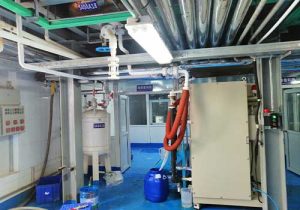water glycol cooling system
Water Glycol Cooling Systems: A Comprehensive Guide
Water glycol cooling systems are widely used in industrial and commercial applications to maintain optimal temperatures. These systems leverage the properties of glycol to enhance the performance of water-based cooling solutions. This article delves into the details of water glycol cooling systems, explaining their operation, benefits, types of glycol used, and the importance of maintenance and safety.

Operation of Water Glycol Cooling Systems
Water glycol cooling systems work by circulating a mixture of water and glycol through a closed-loop system to absorb and dissipate heat from equipment or processes. Glycol, either ethylene or propylene, is mixed with water to create a solution with specific properties that make it ideal for cooling applications.
Freezing Point Depression: One of the primary reasons for using glycol in cooling systems is its ability to lower the freezing point of water. This is crucial for systems operating in colder environments or where the risk of freezing could damage equipment.
Boiling Point Elevation: Glycol also raises the boiling point of the coolant, allowing the system to function effectively at higher temperatures without the risk of the coolant evaporating.

Corrosion Inhibition: Glycol solutions often contain inhibitors that help protect metal components from corrosion, which is crucial in industrial systems where metal equipment is constantly exposed to the coolant.
Types of Glycol Used in Cooling Systems
There are two main types of glycol used in cooling systems:
Ethylene Glycol: Ethylene glycol is highly effective at lowering the freezing point and is generally more efficient than propylene glycol. However, it is toxic, making it unsuitable for applications where contact with food, beverages, or potable water is possible.
Propylene Glycol: Propylene glycol is a less toxic alternative to ethylene glycol and is often used in applications where safety is a concern, such as in food and beverage processing or where incidental human contact is possible. While slightly less efficient in heat transfer, its safety profile makes it the preferred choice in sensitive environments.
Advantages of Using Glycol in Cooling Systems
The use of glycol in cooling systems offers several advantages:

Year-Round Operation: Glycol’s ability to prevent freezing and overheating allows cooling systems to operate year-round, regardless of environmental conditions.
Equipment Protection: Glycol solutions help protect equipment by preventing freezing and corrosion, thereby extending the lifespan of pipes, pumps, and other components.
Improved Heat Transfer: Glycol effectively transfers heat, making it an efficient coolant for a wide range of industrial applications.
Maintenance and Safety of Water Glycol Cooling Systems
Regular maintenance is essential for the optimal performance and longevity of water glycol cooling systems. This includes monitoring glycol levels, checking for leaks, and ensuring that the glycol solution maintains its effectiveness against corrosion and freezing. Safety is also a critical consideration, particularly when choosing between ethylene and propylene glycol, as their toxicity levels differ.
Conclusion
Water glycol cooling systems are a vital technology for industries that require precise temperature control. By understanding their operation, benefits, and the importance of regular maintenance, users can ensure that their cooling systems operate efficiently and safely. As technology advances, these systems continue to evolve, offering more sustainable and efficient solutions for temperature control in various applications.
Related recommendations
refrigeration chillers
324Refrigeration Chillers: A Comprehensive Guide Introduction Refrigeration chillers are integral mechanical systems designed to extract heat from a substance or space and transfer it elsewhe...
View detailsprocess chillers manufacturers
354Process Chillers Manufacturers: A Comprehensive GuideProcess chillers manufacturers are companies dedicated to the design, production, and distribution of chillers used in industrial and commerci...
View detailstemperature control plate
355Understanding Temperature Control PlatesA temperature control plate is a specialized device designed to precisely regulate the temperature of objects or substances placed on it. It serves as a cru...
View details-140℃ Ultra-Low Temperature Chiller Startup and Medium Selection
1487-140℃ Ultra-Low Temperature Chiller Startup and Medium Selection First, the start-up preparation of the -140°C ultra-low temperature chiller Check whether the relevant protective measures...
View details
 LNEYA Chiller
LNEYA Chiller







HelloPlease log in